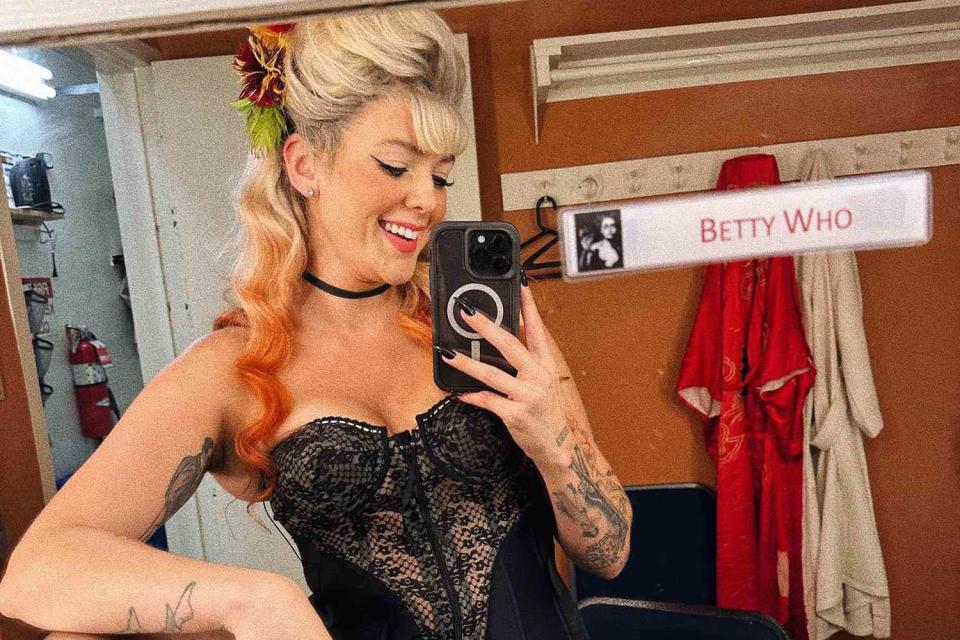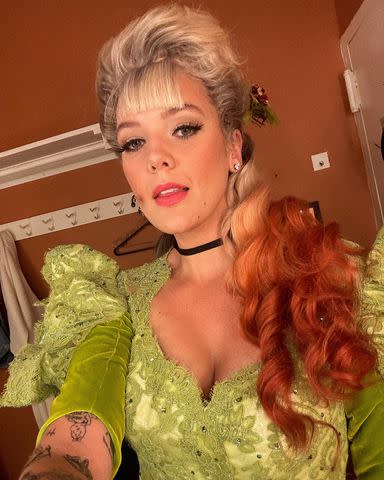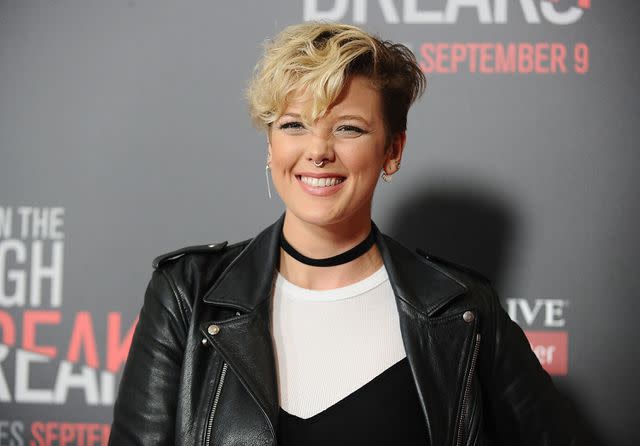Betty Who on Exploring Femininity During Broadway Debut in “Hadestown: ”'It Does Feel Like Drag' (Exclusive)
The Australian pop star joined the cast of the Tony-winning musical as Persephone in September

Betty Who/Instagram
Betty Who backstage at 'Hadestown'Betty Who is getting real about gender identity — and exploring it in their Broadway debut in Hadestown.
The Australian pop star, who identifies as queer and uses she/they pronouns, first hit the stage in the Tony-winning production in September, playing Persephone, the queen of the underworld and Hades' love.
After more than a month's worth of performances in the musical, "I'm honestly just feeling insanely lucky to get the opportunity to do something like this in a show that is this excellent, and I am pinching myself every night," Betty, 32, says.
PEOPLE caught up with the "Somebody Loves You" singer about musical theater, how getting into character as Persephone is like drag and the "transformative power of music."

Betty Who/Instagram
Betty Who backstage at Hadestown on BroadwayHow is performing in a Broadway show different than the tours you've done over the years?
I think the monotony of the eight show a week in the same building is something that's really unusual for me, because yes, [on tour] we might be doing the same show 30 times in six weeks, but every stage is different, every room feels different, the fans feel different.
Honestly, the biggest disconnect for me is the show literally goes on without me here, and that is something that I'm not used to. I'm used to the show absolutely not going on if I am sick or don't show up. So that's kind of mostly what I'm adjusting to emotionally and physically is the trying to be good eight times a week.
And I'm really grateful for the experience to do something other than be Betty Who. I've been doing that for 10 years, and I do feel as any relationship does that it gets a little bit stale and to have a chance to go have a totally different relationship to this woman, Persephone, is so fun. And also distance makes the heart grow fonder. And so it makes me miss singing my own songs and dancing to my own dances and all that stuff. So I'm really enjoying this opportunity to not do that and also look forward to the chance to get to do it again.
Amber Gray, who originated the role of Persephone, was so beloved. Did you have any nerves stepping into her shoes?
Yeah, and I think people are still pretty categorically upset that I am just not Amber Gray. I think everyone's still sort of mad at anybody who's not Amber Gray. I can't do a ton about that. I think I knew that I was going to be really different. I understood that they were doing something very different by hiring me.
So I think I had a really clear understanding of the fact that the reference is only going to take me so far, and I have to really build my own thing here, which was actually really intimidating in a lot of ways because I almost would've preferred to come in and be like, "Here's the blueprint. Do exactly this thing and do it well." But I also think that there are different schools of acting. I can only portray her. It's still coming from my body, my heart, my soul, my expression of her, and just physically, I couldn't look more different than Amber if I tried. And so I think that alone already kind of stops people in their tracks if they had some kind of preconception about what she was meant to be.
Your personal aesthetic is a little more androgynous, and you identify as queer. Does it feel like you're doing drag when you get into character?
Yes. It literally does. 1,000%. I have such hand dysmorphia because I have these crazy claw nails for Persephone, but then I'm in my life and I'm dressed like a boy, and I have these huge stiletto nails on, and I'm like, "Whoa, this is really wild." There's a transition, right? The robe goes on and it's like a blank slate. Then all the makeup, the lashes, all of her jewelry goes on. The wig comes on. The wig is really an important transformative power for her. It does feel like drag.
But also it's funny. I was just talking about this ... that my choice to turn femininity down, I turned the volume down on that knob more and more in the last couple years, to then have my first big acting gig in this way be turning the volume completely all the way up on that. To have this opportunity to have the pendulum swing all the way back to being a capital-W woman, I love her. It is so not me, but I love her and it is really fun to play her. And I think as an artist, as a creative person, something I've always struggled with is having all of these different things be true about me at once, and trying to distill myself down into this really palatable and manageable version of myself that people can digest and experience as Betty Who has always felt like a real challenge because there's so much of me; and I think it makes everything feel a little bit discombobulated or confusing because there are so many elements that I have to share.
And so to have a chance to really hone in and target this one area of she's giving Moulin Rouge, she's giving Marilyn, she's giving Kitty Queen ... I love getting to play with all of those factors and feel like it's not in opposition of my truest nature that I have to try and tap into as Betty Who. I feel a lot of pressure about that. So it's just a load off to be a totally different person for a while.

There is a darkness to Persephone and her "job" and her role in the story. Have you ever struggled with your purpose as a pop star, as an artist?
Oh, have I ever. [I feel like] I'm in therapy all of a sudden. I think that for something I'm really learning from Persephone is that I find she cares a lot more about other people's happiness and existence than her own because I think that she has sort of resigned herself to her own life, and she's using what little energy in life that she feels like she has left to give to those who she thinks she can make more alive. And I think I do relate to that where my life is my life, and I'm really lucky and blessed in all these things, but I think my purpose, my why, has really turned into: It's not about me anymore. I think you get into music because you're selfish and think that you're a star and you think everybody should know it too, and then wake up one day and realize, "Is this just for me?"
I genuinely believe in the transformative power of music and the way that songs can change our hearts and minds and mood. I think that in a world where we are so often isolated and feel so alone and outside of ourselves — to feel solace and comfort in the arts is such a beautiful thing.

Do you have a favorite musical theater production that changed your life?
One of the more transformative musical theater experiences of my life was when my mom took me to Chicago when I was 16 to see the Wicked tour, starring Ms. Annaleigh Ashford as Glinda — one of my favorite musical theater performers to this day. It was to not know where we were headed and to go through that show and that journey and be so transported. I remember the way I gasped when Elphaba comes out of the trap door. I was like, "Oh, musical theater takes you to a place: the storytelling, the way that you can be inside of a story, the way that we suspend reality to sit in a room and watch a bunch of people pretend to have conversations in front of us like we're a fly on the wall." As an audience member to be made to feel these big feelings at an early age of my life...
And I think having such big emotional reactions to the arts made me understand at a young age how impactful and important it can be and how much it can change you and stick with you. I think that's something I really get excited about when I see kids at our show. Even though Hadestown isn't exactly a show for children, and some 10-year-old's mom is like, "She was so excited. She was hoping she could meet Persephone." And I come out and I get to meet them, and they're like, "I love musical theater." You're like, "Oh my God, you're going to remember this moment. I am your Annaleigh Ashford in this moment." And that is such a crazy full circle moment.
For more People news, make sure to sign up for our newsletter!
Read the original article on People.